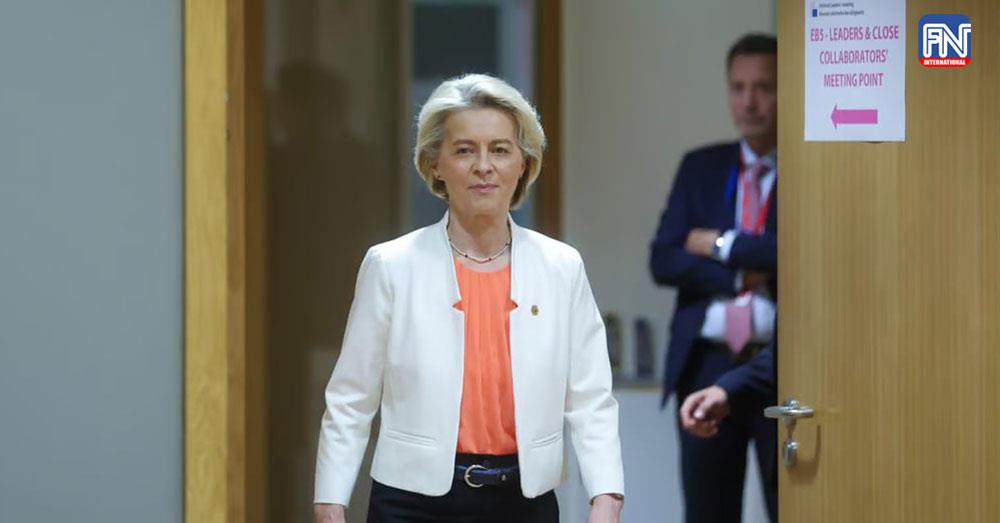BRUSSELS, Jun. 17 (The Politico) — EU leaders failed to back Ursula von der Leyen for another term as European Commission president Monday night, despite assurances from France’s Emmanuel Macron and Germany’s Olaf Scholz in recent days that they were nearing a deal, three EU diplomats told POLITICO.
“There is no agreement tonight,” European Council President Charles Michel told reporters late Monday night after the leaders’ dinner.
A European diplomat, who was granted anonymity to speak candidly about the talks like the others quoted in the piece, said while negotiators agreed on three names, leaders will continue discussions at a later date, presumably at their next meeting on June 27-28.
In the wake of the European election, an early consensus emerged around Germany’s von der Leyen for a second term as European Commission president, Portugal’s António Costa as European Council president, Malta’s Roberta Metsola as the European Parliament boss and Estonia’s Kaja Kallas as foreign policy chief.
Expectations were high as the 27 heads of state and government met in Brussels in the hope of dividing the bloc’s four top jobs among the current coalition of the center-right European People’s Party, socialists and liberals.
After Macron’s party was trounced by the far right in the election, his decision to dissolve the French parliament and call snap a election had seemingly sped up discussions on top jobs. Typically, negotiations take weeks.
In recent weeks, other European leaders also stressed the need for continuity given Russia’s war in Ukraine and the potential return of former U.S. President Donald Trump.
But hopes of a quick deal evaporated Monday night as the European People’s Party, the winner of the European Parliament election, asked for more concessions and more power among the top jobs roles. As expected, the EPP wanted to reappoint von der Leyen and Metsola, both of whom belong to the political family. In addition, the EPP proposed to the socialists that the European Council president’s term be split into two 2.5-year chunks — and the EPP would get one of them.
This, in turn, irked the Socialists and Democrats (S&D), who were hoping to clinch the job for Costa. And soon after talks stalled, the blame game started.
“This was partly hubris from the EPP,” an EU official said. “By asking to have a mandate for only 2.5 years it created a huge perception problem with [socialists], who would be put in a difficult position. The EPP did not play this one well. This will be difficult to solve.”
The official added that Michel did not help in the discussions. “Instead of helping to find a deal, he kept bringing up other things,” the official said.
Another reason talks failed was because Italian Prime Minister Giorgia Meloni was unhappy with how the evening unfolded, several EU diplomats said. Meloni, who was one of the few leaders who came out of the European election with an electoral win, was displeased by attempts by the other EU leaders to lock her out of negotiations.
The Italian prime minister “contested the type of approach to the discussion,” said an official familiar with the discussion. She started “from the assumption that today’s informal meeting should have represented the moment in which to discuss what to do in light of the signals from the European elections and then, from that starting point, to begin the discussion on the names for the top jobs, and not vice versa,” the official added.
Speaking at the G7 late last week, Macron, who is one of the key brokers in the top jobs deal, said he believed Monday’s talks could deliver an in-principle decision.
“It’s a discussion that takes place among the 27; we’ve called each other; [a deal] appears possible in the days that come, in the week that comes,” Macron said.
Scholz echoed those comments later, saying he believed a decision on Brussels’ top jobs would come swiftly. “Decisions will now be made very quickly on the most important posts that need to be filled in Europe in order for the European Union to be able to act,” Scholz said in an interview with Axel Springer media outlets on the sidelines of the G7.
EU leaders will now reconvene in Brussels on June 27-28, hoping to find agreement on the bloc’s leaders before a vote on the next Commission president by the European Parliament slated for mid-July.

Photo from Politico